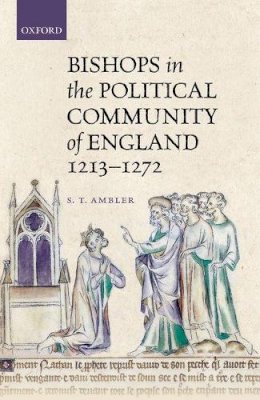
Stock image for illustration purposes only - book cover, edition or condition may vary.
Bishops in the Political Community of England, 1213-1272
S. T. Ambler
€ 145.47
FREE Delivery in Ireland
Description for Bishops in the Political Community of England, 1213-1272
Hardcover. Explores the role of bishops at the heart of thirteenth-century English politics, examining their culture and political theology. Under King John and Henry III, the bishops acted as peacemakers, supporting royal power when it was threatened, but between 1258 and 1265, led by Simon de Montfort, they became partisans, helping to overturn royal power. Num Pages: 256 pages. BIC Classification: 1DBKE; 3H; HBJD1; HBLC1; HBTB; HRCC2. Category: (P) Professional & Vocational; (U) Tertiary Education (US: College). Dimension: 163 x 242 x 21. Weight in Grams: 512.
Thirteenth-century England was a special place and time to be a bishop. Like their predecessors, these bishops were key members of the regnal community: anointers of kings, tenants-in-chief, pastors, counsellors, scholars, diplomats, the brothers and friends of kings and barons, and the protectors of the weak. But now circumstance and personality converged to produce an uncommonly dedicated episcopate-dedicated not only to its pastoral mission but also to the defence of the kingdom and the oversight of royal government. This cohort was bound by corporate solidarity and a vigorous culture, and possessed an authority to reform the king, and so influence political events, unknown by the episcopates of other kingdoms. These bishops were, then, to place themselves at the heart of the dramatic events of this era. Under King John and Henry III-throughout rebellion, civil war, and invasion from France, and the turbulent years of Minority government and Henry's early personal rule-the bishops acted as peacemakers: they supported royal power when it was threatened, for the sake of regnal peace, but also used their unique authority to reform the king when his illegal actions threatened to provoke his barons to rebellion. This changed, however, between 1258 and 1265, when around half of England's bishops set aside their loyalty to the king and joined a group of magnates, led by Simon de Montfort, in England's first revolution, appropriating royal powers in order to establish conciliar rule. Bishops in the Political Community of England, 1213-1272 examines the interaction between the bishops' actions on the ground and their culture, identity, and political thought. In so doing it reveals how the Montfortian bishops were forced to construct a new philosophy of power in the crucible of political crisis, and thus presents a new ideal-type in the study of politics and political thought: spontaneous ideology.
Product Details
Publisher
Oxford University Press
Format
Hardback
Publication date
2017
Condition
New
Weight
511g
Number of Pages
244
Place of Publication
Oxford, United Kingdom
ISBN
9780198754022
SKU
V9780198754022
Shipping Time
Usually ships in 15 to 20 working days
Ref
99-3
About S. T. Ambler
S. T. Ambler undertook her doctoral research at King's College London, with joint supervision at University College London, and received her PhD in 2012 after a year as Thornley Fellow at the Institute of Historical Research. Afterwards she worked on the AHRC-funded Breaking of Britain Project, and from 2013 to 2015 as Senior Post-Doctoral Research Associate on the AHRC's Magna Carta Project at the University of East Anglia. While at King's she taught Medieval British History and since 2013 has taught courses on the Crusades and Norman and Plantagenet England at the University of East Anglia. She has published articles in Historical Research and English Historical Review.
Reviews for Bishops in the Political Community of England, 1213-1272
Ambler's book is a welcome contribution to the study of British church history
Mark Clavier, Anglican and Episcopal History
Ambler's work is good, nuanced, and well argued, and fits into the current trends of the historiography with its sympathetic focus on the bishops as men operating within multiple spheres. It contributes well to the discussions around episcopal roles within the political community of thirteenth-century England
Melissa Julian-Jones, Speculum
an excellent book, bold in its range and persuasive in its reasoning.
J.R. Maddicott, Journal of Ecclesiastical History
Treating politics as an aspect of episcopal pastoral care and the oversight of the latent sinfulness of rulership in the century of the wider pastoral revolution, Ambler offers an innovative reading of English politics during a dramatic period ... offers a stimulating and provocative interpretation and approach which merits serious attention not only for the book's specific analysis of 13th-century England, but as a model for applications more widely across succeeding centuries, during which England's bishops continued to be a significant influence, and were often active and important participants, in national political life.
Robert Swanson, Reviews in History
Mark Clavier, Anglican and Episcopal History
Ambler's work is good, nuanced, and well argued, and fits into the current trends of the historiography with its sympathetic focus on the bishops as men operating within multiple spheres. It contributes well to the discussions around episcopal roles within the political community of thirteenth-century England
Melissa Julian-Jones, Speculum
an excellent book, bold in its range and persuasive in its reasoning.
J.R. Maddicott, Journal of Ecclesiastical History
Treating politics as an aspect of episcopal pastoral care and the oversight of the latent sinfulness of rulership in the century of the wider pastoral revolution, Ambler offers an innovative reading of English politics during a dramatic period ... offers a stimulating and provocative interpretation and approach which merits serious attention not only for the book's specific analysis of 13th-century England, but as a model for applications more widely across succeeding centuries, during which England's bishops continued to be a significant influence, and were often active and important participants, in national political life.
Robert Swanson, Reviews in History
